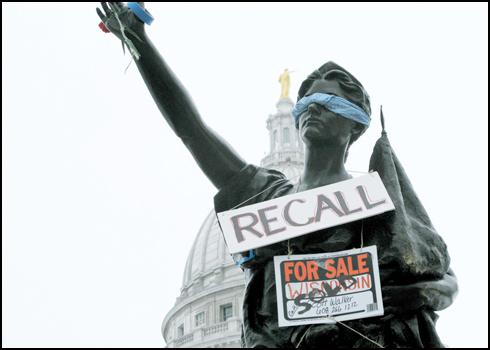Wisconsin Democrats face the latest step this week in their efforts to win control of the state Senate in recall elections, triggered by opposition to Republican Gov. Scott Walker’s anti-public employee union legislation. On Tuesday, six Democratic challengers are running in primaries against some rather unusual opponents, before they can move on to the general elections — and even then, the battle is likely to go on even after the elections.
They key thing to remember is that if there were no primaries — that is, if only one Democrat had filed in each race, with no other Republicans than the incumbents –Â then the six GOP incumbents would be on the ballot Tuesday, with the potential to change control of a chamber where Republicans currently have a 19-14 majority.
Soon after the recall elections were triggered, Republicans declared a strategy to plant fake candidates in the Democratic primaries — which they have called “protest candidates” — in order to delay the general elections from July to August, while the GOP incumbents run unopposed.
The candidates range from a GOP activist in his 20s, to a former Republican state representative who is in his 80s. Also, it turns out the whole scheme will cost local governments throughout the state over $400,000.
Predictably, this has led to some low-level shenanigans, such as a flyer urging conservatives to vote in a Democratic primary for the fake Democrat. Despite the possibility of countering this, Democrats specifically rejected entreaties by labor to respond in kind and run fake Republicans, in order to keep Republican voters in their own primary.
In the unlikely (but not impossible) scenario that an official Democrat might lose their primary in any given race, just consider this: If such candidate couldn’t beat the fake Democrat, how could they ever hope to take on the real Republican?
But that’s not all. Before the recall season is wrapped up, the Republicans in the state legislature are moving quickly on a very special matter: Redistricting, which will help them lock in partisan advantages in the district maps. The changes will not have any effect on the ongoing recalls — they would take effect with the 2012 elections — but would seal in place a map favorable to them even if the people of Wisconsin quickly took away their Senate majority in August.
Of course, there is nothing unusual about a partisan gerrymander in a state where one party has won full control of the legislative and executive branches — both parties are very skilled at doing it throughout the country. But it is a bit unusual for the remap to be going on at the same time as a widespread recall campaign that could flip control of the legislature.
In fact, the Milwaukee Journal Sentinel reports, this move will require special legislation to change the state’s own established redistricting procedures, which usually wait for the redrawing and adjustments of precincts by municipalities:
Scott Fitzgerald spokesman Andrew Welhouse said Republicans would seek to pass separate legislation allowing the legislative and congressional maps to be redrawn before local municipalities finish drawing ward lines. Currently, state law requires the ward lines to be drawn first, which would mean that lawmakers would have to wait until long after the recall elections to pass a redistricting plan.
Welhouse said lawmakers were moving more quickly this year because of new technology, such as computerized mapping. He declined to comment on whether local communities could use that same technology to move more quickly as well.
On a conference call with reporters on Friday, state Dem chair Mike Tate said that a review of the map shows that two of their challengers, Fred Clark and Nancy Nusbaum, have been drawn out of their districts — in Nusbaum’s case, by a half of a block. In addition, incumbent Dem state Sen. Robert Wirch, who is also facing a recall in August, has been drawn out of his district.
The state constitution requires that in order to be eligible for election to the legislature, a candidate must “be a qualified elector in the district which he may be chosen to represent.” This means that if the affected Democratic recall candidates and incumbents win their races, they will have to move in order to continue serving in the same districts. (The U.S. Constitution does not require district-residency for members of the House of Representatives, only state-residency, but many state constitutions have a district requirement for their own legislatures.)









